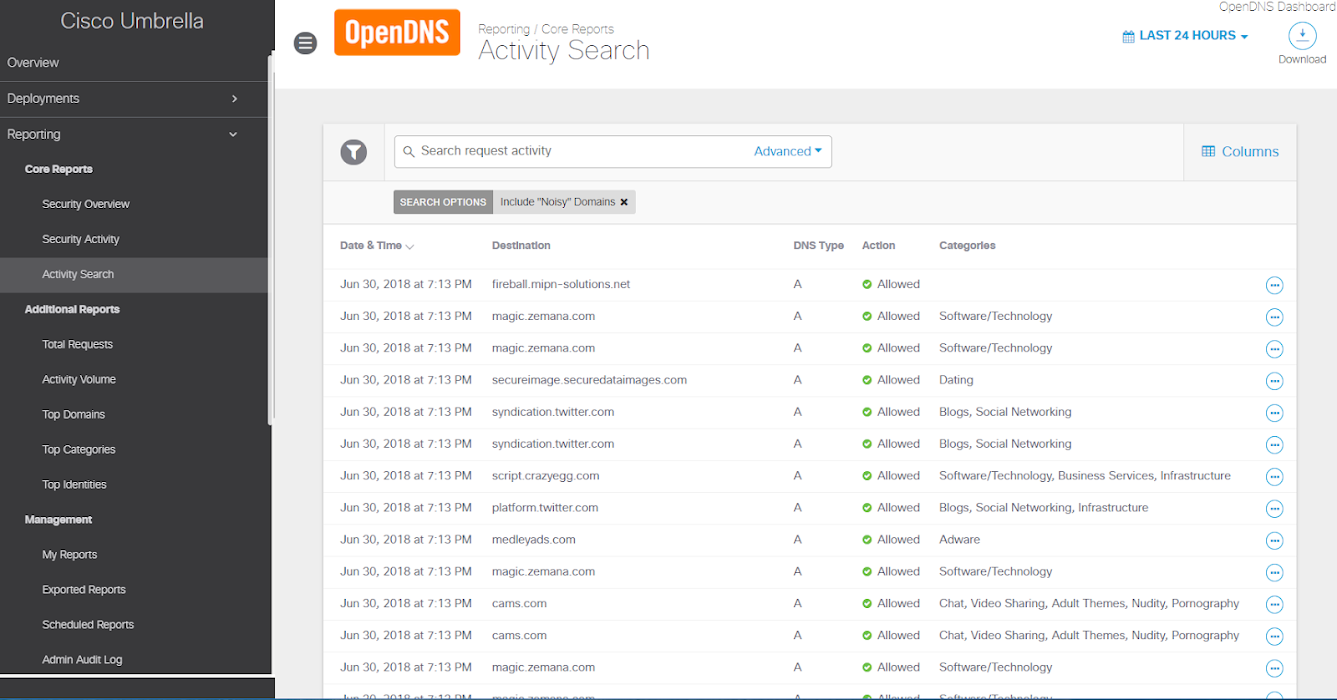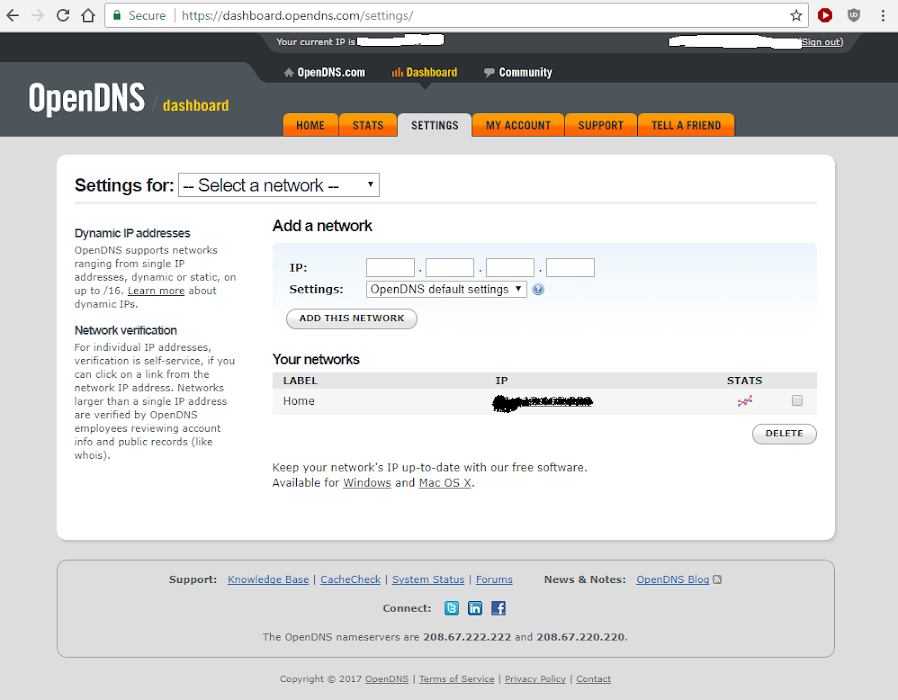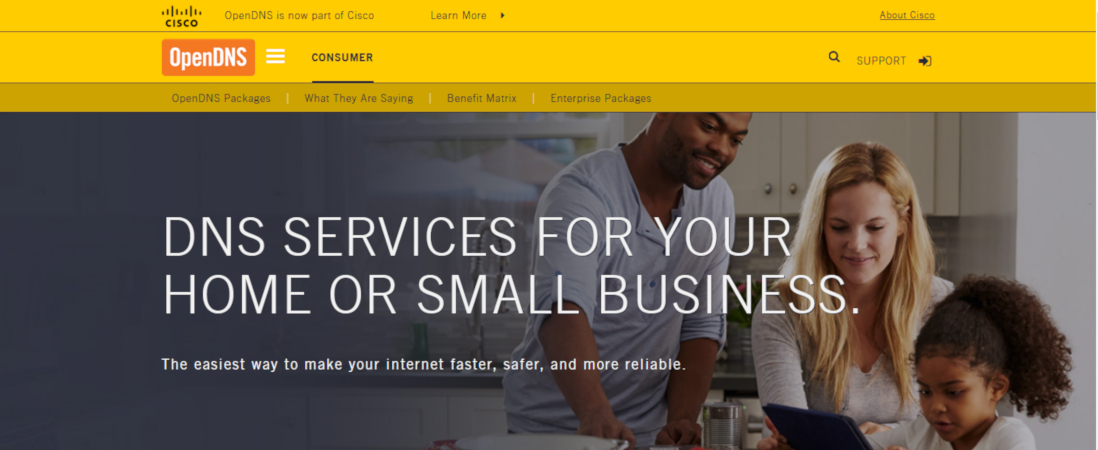TechRadar Verdict
If you’re looking for a decent tool for web filtering or to ensure your internet queries always resolve to the correct IP addresses, OpenDNS is a smart choice.
Pros
- +
Free tier available
- +
Allows manual filtering
- +
Effectively blocks malicious sites
- +
Website caching
Cons
- -
Limited free tier
- -
Relatively slow connection
- -
Limited ad blocking
Why you can trust TechRadar
OpenDNS is an American company based in San Francisco, California. It's the brainchild of David Ulevitch, a serial tech entrepreneur, who first launched EveryDNS, a web-based DNS management software, in 2001 before launching OpenDNS, a recursive DNS service focused on security, in 2006.
In 2015, Cisco, the networking and cybersecurity giant, paid over $600 million to buy OpenDNS, and the DNS resolution service is currently one of the most recognized products in Cisco’s cybersecurity suite.
The OpenDNS platform offers many practical features, including phishing protection, custom content filtering, and DNS lookup. The enterprise version, named Umbrella, also offers additional protection from malware, botnets, and other sophisticated attack vectors.
OpenDNS: Plans and pricing
There are four OpenDNS plans; Family Shield, Home, Home VIP, and Umbrella Prosumer. The first two are free, while the other two are paid plans, making it a freemium product. The Family Shield plan is primarily for parental control, allowing parents to block their kids from accessing specific sites, e.g., adult and gambling sites. The Home plan offers customizable content filtering and basic phishing protection for free.
The Home VIP plan costs $19.95 per year. It includes all the features of the Home plan plus one year of internet usage statistics and an optional allow-list mode. The Umbrella Prosumer plan for enterprises costs $20 per user per year for up to five user profiles with three devices each.

OpenDNS: Features
OpenDNS, like its name suggests, is first and foremost a domain name system (DNS) resolution service. DNS is the decentralized naming system of the web that identifies computers reachable through the internet. It’s akin to the phonebook of the internet, mapping domain names to IP addresses.
The OpenDNS platform uses a large DNS database that's updated frequently. Hence, with it as your DNS resolver, you're sure that any website address you direct your browser to open will resolve to the correct IP address. This feature may seem trivial but it’s really not.
Consider that the default DNS service of your default internet service provider (ISP) could be vulnerable to flaws. Have you ever tried to open a site that just doesn’t want to resolve even though the status page shows that the website is perfectly up and running? It may be that your DNS service isn’t resolving to the correct IP address, maybe an outdated one.
The idea of using OpenDNS in place of your ISP’s default DNS provider is to ensure your web browser queries are redirected to their intended IP addresses. It can also improve the speed of your browsing, as OpenDNS is a pretty fast service that processes a whopping 100 billion DNS queries daily.
At times, hackers can maneuver their way into a DNS service and configure it to redirect users to malicious websites. They may redirect web address queries to websites filled with scammy advertisements or malware links. Sometimes, they redirect users to a clone of their intended web address to trick them into giving up account credentials, i.e., phishing.
For example, a malicious actor may redirect user queries for a banking website’s login page to a strikingly similar page but on the wrong web address. Hence, users may confuse this similar page for the original without paying attention to the web address and input their banking credentials, which the hackers harvest. Using OpenDNS can protect you from such attack vectors, as the platform has a database of malicious IP addresses that it automatically blocks users from accessing. This database is updated continually, given that hackers never stop creating new malicious sites.
With OpenDNS, you can be sure that your risk of accessing a malicious website through a redirect is minimal.
Custom content filtering is another core feature of OpenDNS. You can block specific web addresses from your network so that your device can never access them. This feature comes in handy for parents who want to block their children from accessing sites that they’re not yet suited to handle or sites where they can be easily tricked, e.g., adult and gambling sites.
Subscribers to OpenDNS’s paid plans get additional features, such as allow-lists. Thanks to allow-lists, you can create a "locked-down" environment that restricts internet access to a few domains. This feature comes in handy at schools where students need to use the internet for learning and simultaneously must avoid distracting sites.
Likewise, paid users can access a year's worth of their internet usage statistics. This feature helps them monitor their browsing habits and deduce where to make improvements.

OpenDNS: Interface and use
Setting up OpenDNS is pretty easy, mainly for free-tier users. The main thing to do is to put OpenDNS’ nameservers (208.67.222.123 or 208.67.220.123) in place of your device’s default nameservers. It works for laptops, home routers, game consoles, TVs, smartphones, or anything that connects to the internet from your home network.
OpenDNS: Support
All OpenDNS users, both free and paid, have access to direct email support. However, the platform prioritizes the requests of paid users over non-paying users. OpenDNS also provides detailed documentation on its website to help users get familiar with all aspects of the platform. Likewise, you can access the FAQ page or official support forum when you need help.
OpenDNS: The competition
There’s no shortage of DNS services rivaling OpenDNS. Well-known alternatives include Google Public DNS and Quad9, which are both completely free to use and provide first-rate security, making them comparably better than OpenDNS.
OpenDNS: Final verdict
We consider OpenDNS a decent DNS resolution service that can protect you from sophisticated online attacks. It’s also a practical tool for custom content filtering, both for households and large enterprises. However, one flaw we noticed is that the platform provides limited ad blocking tools, allowing you to block only ads it deems malicious but not general advertisements.
- Save your data online with the best cloud storage.
Stefan has always been a lover of tech. He graduated with an MSc in geological engineering but soon discovered he had a knack for writing instead. So he decided to combine his newfound and life-long passions to become a technology writer. As a freelance content writer, Stefan can break down complex technological topics, making them easily digestible for the lay audience.

